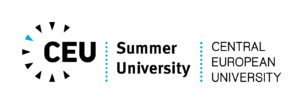Summer University course of Central European University organized in cooperation with New Exploratory Phase in Research on East European Cultures of Dissent (CA 16213), hosted by the
Vera and Donald Blinken Open Society Archives, Budapest, Hungary. The main, intensive part of the course will last for 5 days (January 18-22). After this, the course will switch into a more self-guided mode, supplemented by one-on-one tutorials and a weekly group meeting on Fridays from January 29 to February 26, 2021.
Course Rationale
We aim to develop a strong cohort of scholars of East European cultures of dissent who are fluent with the concepts and practices of digital history, and interested in carrying out larger-scale, possibly collaborative projects in the future.
Our goal is to find new ways of leveraging technology to strengthen research networks and incubate collaborative scholarship as the first step in a larger project: to develop a stand-alone training module that could support future self-guided interactions for specialists in this area. Eventually, such a resource would allow researchers with intersecting interests in Cold War-era cultures of dissent to learn about digital approaches to the field, broader conceptual problems in digital history, and then specific, skill-based techniques to integrate their own sources and collections of materials into a network of related projects.
Course Format
As a very first step towards that goal, we offer a 6-week online course from early January through mid-February 2021.
Week 1 – Intensive, interactive, synchronous meetings
The first week will feature short, interactive documentaries containing both overviews of the field of digital history and skill-based demo sessions. Participants will be responsible for working through the first part of each lesson on their own. As a follow-up, we will hold live, synchronous ‘teach-in’ meetings in which faculty will elaborate on some of the points provided in the lesson, as well as answer specific questions. Participants are expected to spend the afternoon working individually or in small groups online through applications of each instance.
Week 2-6 – mostly self-guided learning supplemented by one-on-one tutorials and one weekly group meeting on Fridays
After the first, intensive week of the course, we will turn to a more self-guided mode, and participants will start to experiment/test drive both the demo datasets and their own datasets through different methods, using different tools (breakout sessions continued). Faculty will be available for one-on-one support, guidance, and feedback as needed in a tutorial structure. Each Friday, we will meet as a group synchronously to report on steps taken, show progress, troubleshoot issues that are coming up across projects (feedback sessions).
On the last Friday of the course, in mid-February, participants will present their projects via synchronous videoconference.
This format will be well suited to incubate DH projects, creating space, in addition to acquiring new skills, for employing these skills in supervised tinkering with data.
The size of the cohort will be 20-25, with a 1:3 faculty/student ratio, and different faculty responsible for various aspects of the course.
All material produced for this course and/or a sustainable stand-alone module will be made available via open access platforms and repositories, and all datasets (which do not consist of private, personal, or protected data) will be shared as well.





